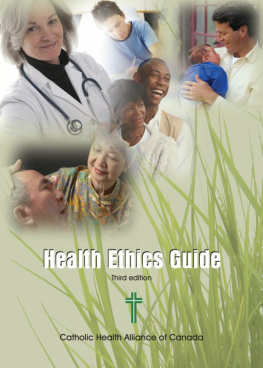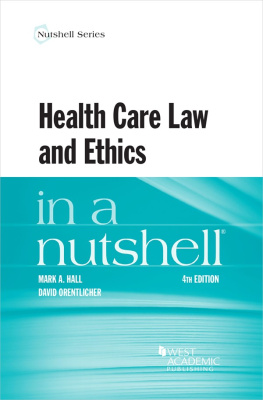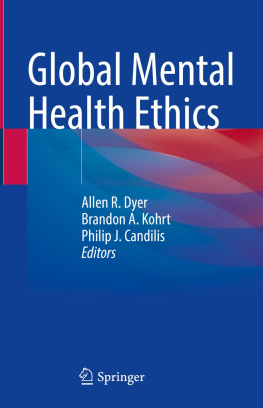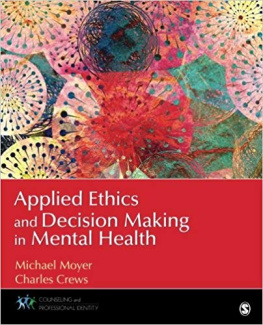First Printing September 2012
Catholic Health Alliance of Canada, 2012
All rights reserved. No part of this publication may be reproduced, stored in a retrieval system or transmitted in any form or by any means, electronic, mechanical, photocopying, recording or otherwise (except brief passages for the purpose of a review) without the written permission of the Catholic Health Alliance of Canada.
Nihil obstat: The Health Ethics Guide was approved by the Permanent Council of the Canadian Conference of Catholic Bishops in May 2012.
Photo credits Front cover: iStockphoto; page 18: St. Josephs Health
Centre, Guelph; pages 54 and 68: Covenant Health, Edmonton; back cover: photo and sculpture of The Good Samaritan by Fr. Herman Falke, Ottawa.
Library and Archives Canada Cataloguing in Publication
Health ethics guide.
Includes index.
ISBN 978-0-920705-43-8 ISBN (EPUB) 978-0-920705-45-2
1. Medical ethics. 2. Medicine--Religious aspects--Catholic Church. 3. Catholic health facilities. 4. Christian ethics--Catholic authors.
I. Catholic Health Alliance of Canada
R725.56. C38 2012 174.2 C2010-901351-4
Published by the Catholic Health Alliance of Canada
Annex C, Saint-Vincent Hospital
60 Cambridge Street North, Ottawa, ON K1R 7A5
Telephone: 613-562-6262 ext. 2164
www.chac.ca
Distributed by: Novalis
To order copies go to: www.novalis.ca
E-mail:
Tel: 1-800-387-7164 (toll-free Canada and US only)
Fax: 1-800-204-4140
Acknowledgements
This third edition of the Health Ethics Guide is based on thework of an extremely large number of people who volunteeredtheir time and expertise to bring to fruition this communal reflectionon health ethics in the Catholic tradition. Naming everyone wouldbe a difficult task. However, some of that number who were mostinvolved should be recognized.
The process was ably coordinated and directed throughout byJames Roche.
The Steering Committee members who initiated the review processin 2007 were Rev. Michael Prieur, James Roche, Pat Murphy,Gordon Self, Moira McQueen and Ashley Carlson.
The Core Group members from 2007 to 2010 with overallresponsibility for the subcommittees for each chapter and for thefinal guide were Rev. Michael Prieur (Chairperson), ArchbishopBertrand Blanchet, Eoin Connolly, Hazel Markwell, Sr. NualaKenny, Pat Murphy, James Roche, Gordon Self, Bishop NolSimard, Michael Coughlin (Editor) and Greg Humbert (layout anddesign). In addition, Richard Fraser, QC, provided a legal reviewof the guide.
We are also grateful to Rev. Francis Morrisey OMI and Rev.Jack Gallagher CSB for their assistance during the process leadingto the granting of the nihil obstat by the Canadian Conference ofCatholic Bishops.
At the beginning of the process, a large group of reviewersprovided essential feedback on the adequacy of the 2000 HealthEthics Guide, along with suggestions for revision. Subsequently,Core Group members chaired subcommittees for each chapter;each subcommittee included a number of additional members whoreviewed the state of the field covered in each chapter andarticulated the additions and revisions to be incorporated. Thisgroup provided invaluable input from a wide range of professionals,Canadian and international, with experience in health care, ethicsand theology.
This additional group of volunteer reviewers and subcommitteemembers included Rev. Robert Allore SJ, Sr. Anne Anderson CSJ,Andrew Baker, Carolyn Baker, Jean Bartkowiak, Sandra Bazley,Rev. Walter Black MSC, Barry Brown, Bridget Campion, TomCorbett, John Dossetor, Bishop Brian Dunn, Marguerite Evans,Len Evenson, Rory Fisher, Michael George, Joseph Gilbert, RobertGordon, Rev. Richard Gula SS, Michael Hadskis, Ron Hamel,Laurie Hardingham, Gerry Heeley, John Heng, Melody Isinger,Sr. Joan Kalchbrenner RHSJ, Rev. Roger Keeler, Michael Keim,Jennifer Leddy, Rene Leiva, David Levangie, Margaret Love,Abbyann Lynch, Tom Maddix CSC, Ron Marr, Susan McClement,Don McDermott, Moira McQueen, Rev. Mark Miller CSsR,Patricia Murphy, Cliff Nordal, Rev. Kevin ORourke OP,Pat Pocock, Zinia Pritchard, Carol Taylor, Rev. John Perry SJ,Larry Reynolds, Sr. Mary Rowell CSJ, Giles Scofield, Rev. MylesSheehan SJ, Margaret Somerville, Daniel Sulmasy OFM, CarolTaylor, Rev. Leo Walsh CSB, Helen Watt and George Webster.Reviews were also received from various ethics committees:Ethics Committee, Covenant Health, Edmonton; Ethics Committee,St. Josephs Health Care, London; Ethics Council, St. BonifaceGeneral Hospital, Winnipeg; and Ethics Committee, St. JosephsResidence, Winnipeg.
Preamble
The 1991 Health Care Ethics Guide published by the CatholicHealth Association of Canada stated that the guide should beexamined and revised at regular intervals as newer insights occur,and in order to respond better to the ethical issues of the day. Thesubsequent Health Ethics Guide published in 2000 was such arevision. It included an increased focus on health care in thecommunity and on the widening social dimensions of health caresuch as health promotion and disease prevention, social services,acute care, long-term care, chronic care rehabilitation and homecare. This current revision of the Health Ethics Guide is againmeant to provide guidance around new advances in science andmedicine. Moreover, it seeks to more firmly ground the guide inthe Gospel message of Jesus as exemplified in the parable of theGood Samaritan, which serves as a model of how to respond toones neighbour in need. In addition, this revision of the HealthEthics Guide incorporates a more fully articulated vision of thesocial nature of health care along with the values and principlesthat are embedded in the parable of the Good Samaritan.
The Health Ethics Guide is intended to assist a number of differentaudiences. It is written with the recognition that many staff andeven board members and administrators today are less familiarwith the Catholic tradition and the legacy of Catholic health carethan formerly.
Most specifically, the Health Ethics Guide outlines the moralobligations for the sponsors/owners, boards, members of ethicscommittees and personnel of Catholic health and social serviceorganizations. For Catholics working in health and social serviceorganizations that are not Catholic sponsored, the Health EthicsGuide provides valuable assistance. For people who work inCatholic health and social service organizations, regardless ofwhether they are members of the Catholic faith tradition, theHealth Ethics Guide presents Catholic teaching and outlines thevalues that are to be respected by those who work within theorganization. Finally, the Health Ethics Guide can be used bypersons receiving care, their families and anyone who seeks aframework to structure and articulate their own decision making.It also informs them about what to expect from care providerswho function according to such a vision of care.
Such a guide can provide a perspective and a general direction. Itdoes not substitute for the direction and teaching of Churchauthorities or for organizational responsibilities or for the need tofollow an informed conscience.
The Health Ethics Guide serves to guide the development oflocal protocols. The nihil obstat of the Permanent Council of theCanadian Conference of Catholic Bishops does not serve as asubstitute for the authority of the diocesan bishop, but aims tosupport it. Local protocols will defer to the judgement of thediocesan bishop when there is a question of faith or morals.








